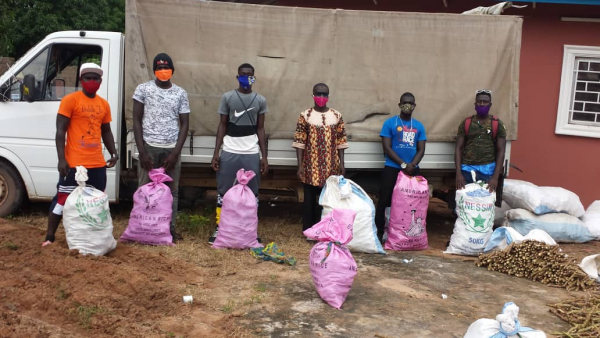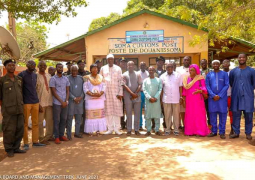
In view of establishing market linkages with successful enterprises, GIZ partnered with Aspuna Gambia Ltd. as an industrial buyer of cassava, the Global Youth Innovation Network (GYIN) Gambia acting as the main coordinator, the National Agricultural Research Institute (NARI) as a technical partner and provider of improved varieties of cassava, as well as the Department of Horticulture (Ministry of Agriculture) and the NEMA project.
Equipped with improved varieties of cassava cuttings, a market linkage is formed between the suppliers (farmers) and a client (Aspuna), thereby providing a guaranteed and reliable market for their produce at an industrial scale with a sustainable and increased income stream. This is all the more crucial in the midst of a global pandemic when crop growers are reeling from the impact of an economic slowdown and a reduction in spending capacity.
As a leading company specialized in the processing of cassava into starch, Aspuna needs the raw materials to sustain the business whilst the cassava producers needed a market to sell their produce, hence creating a win-win situation for both parties. “I was glad that we had Aspuna to buy the produce at one go because I was unable to sell enough due to the Covid-19 lockdown,” says one of the beneficiary farmers, Phillip Jatta, who discovered to be one of the most productive cassava farmers in his village after his produce got weighed by Aspuna. Despite the fact that the global pandemic has seen a decline in sales, Phillip is confident that Aspuna will continue buying from them in the future.
In creating a sustainable supply chain in the cassava industry, the farmers are equipped with a new and improved variety of cassava of superior quality in terms of yield (more than 5 kg per cutting) and starch content (70% higher). This puts them on the path to achieving industrial scales of productivity and multiplying their income. At the same juncture, some farmers built a keen interest in cassava production after they received cuttings from the initial 2-day common agropreneurship training: "The training was so important to me because I started my cassava farm right after which is something I've been planning for over 3 years," says Amie Simaha the founder and CEO of Marseh Sa Kerr. She also highlighted that the start was a smooth ride for her as Aspuna was quick to help her develop her land for a proper yield. Such initiatives, as Amie buttressed, are crucial especially in supporting young farmers who can always go back to their lands after every rainy season with the certainty that their produce will find a market outlet.
With an added advantage of understanding the agricultural value chain especially in the cassava industry, the farmers are hoping for improved collaboration between them and the stakeholders for an increase in productivity and farm yield. This continues to manifest as the EU Tekki Fii Project implemented by GIZ does not only train youths to be equipped with technical and entrepreneurial skills but also trains them in organic farming and supports them to create linkages with buyers for a more sustainable development of their businesses.
In addition, GIZ in partnership with newly identified national agro-based enterprises envisages to diversify and increase the number of crops to include corn and Chili pepper besides introducing a poultry scheme and supporting the farmers to create their own cooperatives. These complementary measures are all meant to increase the outgrowers’ chances of sustaining their businesses and consolidating their livelihoods.






